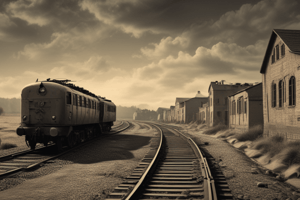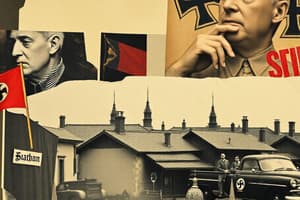Podcast
Questions and Answers
What was a significant economic issue Germany faced after World War I?
What was a significant economic issue Germany faced after World War I?
- Surplus production
- Economic boom
- Hyperinflation (correct)
- Deflation
How did Hitler establish control over the Nazi Party in 1934?
How did Hitler establish control over the Nazi Party in 1934?
- By winning a presidential election
- Through the Night of the Long Knives (correct)
- By leading a coup against the Weimar government
- By forming alliances with other political parties
Which ideological tactic was effectively used by Hitler to foster national pride and anti-Semitism?
Which ideological tactic was effectively used by Hitler to foster national pride and anti-Semitism?
- Social Darwinism
- Collective farming
- International diplomacy
- Propaganda (correct)
What was one of the consequences of Hitler’s aggressive expansionist policies?
What was one of the consequences of Hitler’s aggressive expansionist policies?
What was a key reason for the rise of the Nazi Party during the Weimar Republic?
What was a key reason for the rise of the Nazi Party during the Weimar Republic?
What was a primary method used by the Gestapo to maintain control in Nazi Germany?
What was a primary method used by the Gestapo to maintain control in Nazi Germany?
What did Hitler prioritize to reduce unemployment in Germany?
What did Hitler prioritize to reduce unemployment in Germany?
What was the primary function of concentration camps under Hitler's regime?
What was the primary function of concentration camps under Hitler's regime?
What was the impact of the Holocaust on international norms regarding genocide?
What was the impact of the Holocaust on international norms regarding genocide?
In what way did the Treaty of Versailles contribute to Hitler's rise to power?
In what way did the Treaty of Versailles contribute to Hitler's rise to power?
What were two methods Hitler used to suppress opposition within Germany?
What were two methods Hitler used to suppress opposition within Germany?
How did hyperinflation affect the political landscape in Germany during Hitler's rise?
How did hyperinflation affect the political landscape in Germany during Hitler's rise?
What was the significance of the Beer Hall Putsch in Hitler's political career?
What was the significance of the Beer Hall Putsch in Hitler's political career?
Describe how Hitler's economic policies prioritized militarization.
Describe how Hitler's economic policies prioritized militarization.
What role did propaganda play in promoting Nazi ideology?
What role did propaganda play in promoting Nazi ideology?
Identify a major consequence of Hitler's aggressive expansionist policies during World War II.
Identify a major consequence of Hitler's aggressive expansionist policies during World War II.
Flashcards
Hitler's impact - Holocaust
Hitler's impact - Holocaust
Hitler orchestrated the genocide of millions, especially Jews, setting a terrible example of mass extermination.
Hitler's impact - WWII
Hitler's impact - WWII
Hitler's policies ignited a world war, causing millions of deaths and major shifts in international relationships.
Hitler's rise - Nazi Party
Hitler's rise - Nazi Party
Hitler joined the German Workers' Party, which he transformed into the Nazi Party.
Hitler's rise - Beer Hall Putsch
Hitler's rise - Beer Hall Putsch
Signup and view all the flashcards
Hitler's control - Night of the Long Knives
Hitler's control - Night of the Long Knives
Signup and view all the flashcards
Hitler's control - Propaganda
Hitler's control - Propaganda
Signup and view all the flashcards
Germany's problems - Hyperinflation
Germany's problems - Hyperinflation
Signup and view all the flashcards
Germany's problems - Political Instability
Germany's problems - Political Instability
Signup and view all the flashcards
Lebensraum
Lebensraum
Signup and view all the flashcards
Night of the Long Knives
Night of the Long Knives
Signup and view all the flashcards
Gestapo
Gestapo
Signup and view all the flashcards
Treaty of Versailles
Treaty of Versailles
Signup and view all the flashcards
What fueled Hitler's rise?
What fueled Hitler's rise?
Signup and view all the flashcards
Hitler and Propaganda
Hitler and Propaganda
Signup and view all the flashcards
Concentration Camps
Concentration Camps
Signup and view all the flashcards
What was Hitler's key policy?
What was Hitler's key policy?
Signup and view all the flashcards
Study Notes
Hitler's Legacy and Impact
- Orchestrated the Holocaust, a genocide of 6 million Jews and millions more, setting a horrific precedent for mass extermination.
- Initiated World War II, resulting in 70-85 million deaths and reshaping global relations through aggressive expansionism.
- Established a totalitarian regime dismantling democratic institutions, suppressing dissent, and fostering an atmosphere of terror.
- Effectively used propaganda to promote Nazi ideology, fueling nationalism and anti-Semitism to justify atrocities.
Problems in Pre-Nazi Germany
- Hyperinflation crippled the German economy, rendering currency worthless and causing widespread poverty post-World War I.
- Political instability plagued the Weimar Republic due to ineffective governance, civil unrest, and rising radicalism, creating opportunities for extremists.
- Social discontent fueled by the Treaty of Versailles' harsh terms and a desire for drastic solutions fueled support for radical solutions like Hitler.
Hitler's Rise to Power
- Joined the Nazi Party after World War I.
- Led the failed Beer Hall Putsch in 1923, resulting in his imprisonment.
- During his imprisonment, he wrote "Mein Kampf."
Suppressing Opposition
- Eliminated SA leadership and other rivals in the Night of the Long Knives (1934).
- Implemented strict censorship, banning opposing views and promoting Nazi propaganda.
- Used the Gestapo, the secret police, instilling fear through intimidation and surveillance.
- Used concentration camps to imprison and execute political opponents and perceived enemies.
Key Policies
- Pursued militarization and expansion, violating the Treaty of Versailles and seeking Lebensraum (living space).
- Prioritized military spending and public works to reduce unemployment, sometimes compromising individual freedoms.
- Implemented systematic extermination policies against Jews, Roma, and other targeted groups—the Holocaust.
- Created a cult of personality around himself through propaganda, promoting Aryan supremacy and justifying his actions.
Hitler and World War II
- Initially achieved quick victories using blitzkrieg tactics, expanding Nazi territory rapidly.
- Suffered major setbacks like the Battle of Stalingrad (1942-1943) marking the decline of the Third Reich.
- Died by suicide in his Berlin bunker in April 1945 as Allied forces approached.
Studying That Suits You
Use AI to generate personalized quizzes and flashcards to suit your learning preferences.




